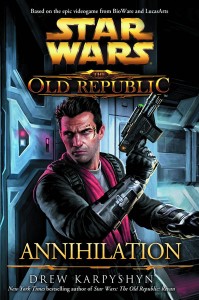As someone who hasn’t really kept up with the Old Republic novels or gotten around to playing the new game, I went into Annihilation not expecting anything more than a decent read where I’d have to continuously look up references to events I had no knowledge of. What I actually got was an incredibly fun read where I only occasionally had to reference Pablo Hidalgo’s Essential Reader’s Companion for dates and general information. Color me very pleasantly surprised.
Drew Karpyshyn’s latest novel, The Old Republic: Annihilation, centers around Theron Shan, a field agent for the Republic’s Strategic Information Services. He’s also secretly the son of Jedi Grand Master Satele Shan but has no connection to the Force. (Spoiler Alert: This will definitely be a plot point later.) The Sith Empire has at its command a technologically impressive and incredibly dangerous warship called the Ascendant Spear. Under the symbiotic control of Darth Karrid, it is a ship that the Republic has to destroy if they want to ultimately beat the Sith Empire. Cue Operation End Game: It’s up to Theron Shan and Jedi Master Gnost-Dural to find a way to stop Darth Kerrid and the Ascendant Spear.
The plot itself is entertaining and never really drags. The book is one part spy, one part action, and often left me fondly reminded of the X-Wing novels. It opens with an unauthorized mission that helps establish not only the tone of the novel but also who Theron is both as a person and as an agent. The book continues to move the overarching plot forward with just the right amount of missions/ action sequences to keep things interesting but not enough so that it feels overly excessive. The threat of the Ascendant Spear also works well because it presents enough of a danger to warrant Operation End Game but doesn’t fall victim to Ridiculous Super Weapon Syndrome.
One of the book’s highlights was the brief chapter that focuses purely on the poor Imperial Minister of Logistics. No one really appreciates the work he does and obviously the Empire wouldn’t function nearly as smoothly without him. Efficiency is everything and the politics of the Sith Lords are a nuisance even if he does know how to play that game. It’s amusing and a nice (yet relevant) break from the main storyline.
The characters are what really help the novel succeed. Theron himself is an interesting protagonist who occasionally gives off a strong Corran Horn vibe because of his huge amount of self-confidence. He’s self assured and a bit cocky at times but it never truly spills over to arrogance. He also doesn’t fall into the expected trap one would expect of the Force blind offspring of the Jedi and never really broods on it. Does Theron have some unresolved issues in regards to his mother? Sure, but they never become a defining character trait and only really surface when prompted by circumstances. Another entertaining character was Marcus Trant, the Director of SIS, who you just can’t help but sympathize with when he has to deal with Theron’s antics in the field. He’s good at his job, struggles a bit with his personal life, and just positively had it up to here with Theron some days but can’t fire such a valuable agent. Gnost-Dural, the token Jedi of the book, was another pleasant surprise who left me intrigued about his life from before the book’s start. I also found myself soon warming to Teff’ith, the young smuggler who has a very weird bond with Theron. She’s incredibly independent and doesn’t want Theron poking into her business. Her speech patterns thankfully manage to walk on the right side of endearing or irritating and she ultimately has one of the best lines in the book.
The only thing that I wasn’t really a fan of was the family plot line. Theron learns who his father is about a third of the way through the book and it is not exactly the shocker of the century. As a whole, the plot line actually works with the book but the obligatory awkward family scenes left me rolling my eyes because they felt too expected at times. However, they didn’t detract drastically from my enjoyment of the book.
Overall, I give Annihilation a 3.5/5 and say that it is definitely worth the read especially if you are interested in the era or are looking for a fun Expanded Universe book that’s not part of a giant series.
Thank you to Random House for providing us with an advanced copy of the book for review purposes.



Great review. Mirrors many of my thoughts.
Pingback: Tosche Station Radio #36: Authenticity | Tosche Station
Pingback: EU Retrospective: The Really Old Republic | Tosche Station